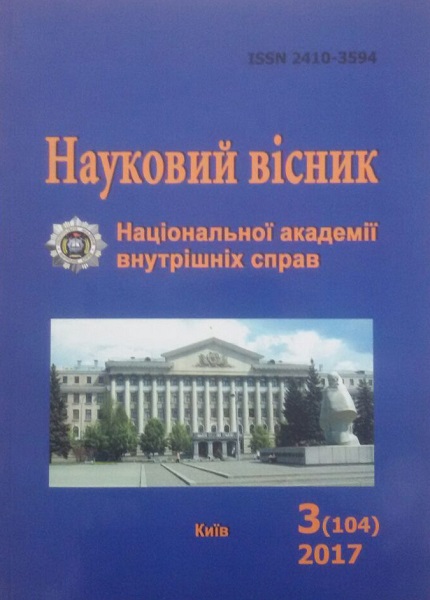The Problem of Distinction between the Administrative Offenses and the Crimes in the Area of Public Order
Abstract
The article analyzes the problems of separation of offenses in the field of public order. The problem of distinguishing administrative offenses from crime for a long time exists both in legal science and in judicial practice. Since the proclamation of independence in Ukraine, significant positive changes have taken place in its socio-political and economic life. A number of laws and other normative legal acts were adopted that changed the competence of public authorities, resolved issues of property relations, content of rights and obligations directly related to the field of protection and protection of public order and public safety.
The legal concept of public security can be defined as the socially necessary or desired level of protection of objects that ensure the functioning of social institutions and are necessary prerequisites for normal social development. The legal system must have such mechanisms in which the recognition of a criminal actwould not be solely depending on the legislator. In connection with this division there is a problem of delineation of criminal offenses and administrative misconduct, since it is not easy to draw a line between them. Recognition of the systemic connection of crimes and other offenses is justified by studies that find the connection of immoral acts that are close to the administrative guilty, which in turn models the composition of the crime. There are also close ties and mutual influences of individual offenses, which allows us to examine and study the causes common to all offenses
Downloads
Abstract views: 81 PDF Downloads: 81
- Authors reserve the right to authorship of their own work and transfer to the magazine the right of the first publication of this work under the terms of the Creative Commons Attribution License, which allows other persons to freely distribute published work with mandatory reference to authors of the original work and the first publication of an article in this magazine.
- Authors have the right to enter into separate additional agreements on non-exclusive dissemination of the work in the form in which it was published in the journal (for example, to post an article in the institution's repository or to publish as part of a monograph), provided that the link to the first publication of the work in this journal is maintained.
- The journal's policy allows and encourages the posting of articles by authors on the Internet (for example, in electronic storehouses of institutions or on personal websites), both before the submission of this manuscript to the editorial office and during its editorial processing, as this contributes to the creation of a productive scientific discussion and positively affects the efficiency and dynamics of citing the published work.




